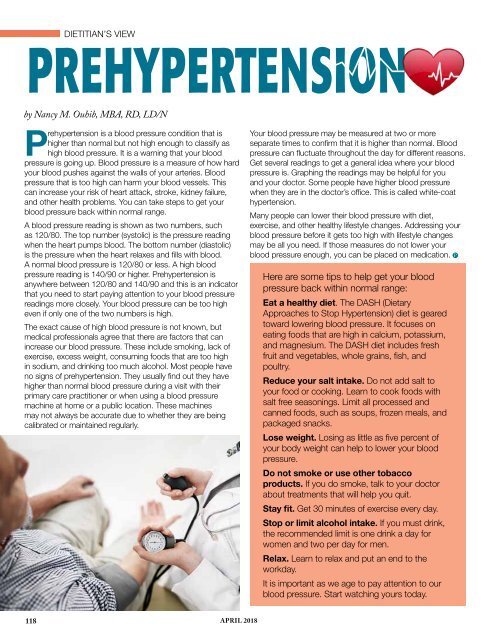April 2018
You also want an ePaper? Increase the reach of your titles
YUMPU automatically turns print PDFs into web optimized ePapers that Google loves.
DIETITIAN’S VIEW<br />
PREHYPERTENSION<br />
by Nancy M. Ouhib, MBA, RD, LD/N<br />
Prehypertension is a blood pressure condition that is<br />
higher than normal but not high enough to classify as<br />
high blood pressure. It is a warning that your blood<br />
pressure is going up. Blood pressure is a measure of how hard<br />
your blood pushes against the walls of your arteries. Blood<br />
pressure that is too high can harm your blood vessels. This<br />
can increase your risk of heart attack, stroke, kidney failure,<br />
and other health problems. You can take steps to get your<br />
blood pressure back within normal range.<br />
A blood pressure reading is shown as two numbers, such<br />
as 120/80. The top number (systolic) is the pressure reading<br />
when the heart pumps blood. The bottom number (diastolic)<br />
is the pressure when the heart relaxes and fills with blood.<br />
A normal blood pressure is 120/80 or less. A high blood<br />
pressure reading is 140/90 or higher. Prehypertension is<br />
anywhere between 120/80 and 140/90 and this is an indicator<br />
that you need to start paying attention to your blood pressure<br />
readings more closely. Your blood pressure can be too high<br />
even if only one of the two numbers is high.<br />
The exact cause of high blood pressure is not known, but<br />
medical professionals agree that there are factors that can<br />
increase our blood pressure. These include smoking, lack of<br />
exercise, excess weight, consuming foods that are too high<br />
in sodium, and drinking too much alcohol. Most people have<br />
no signs of prehypertension. They usually find out they have<br />
higher than normal blood pressure during a visit with their<br />
primary care practitioner or when using a blood pressure<br />
machine at home or a public location. These machines<br />
may not always be accurate due to whether they are being<br />
calibrated or maintained regularly.<br />
Your blood pressure may be measured at two or more<br />
separate times to confirm that it is higher than normal. Blood<br />
pressure can fluctuate throughout the day for different reasons.<br />
Get several readings to get a general idea where your blood<br />
pressure is. Graphing the readings may be helpful for you<br />
and your doctor. Some people have higher blood pressure<br />
when they are in the doctor’s office. This is called white-coat<br />
hypertension.<br />
Many people can lower their blood pressure with diet,<br />
exercise, and other healthy lifestyle changes. Addressing your<br />
blood pressure before it gets too high with lifestyle changes<br />
may be all you need. If those measures do not lower your<br />
blood pressure enough, you can be placed on medication. P<br />
Here are some tips to help get your blood<br />
pressure back within normal range:<br />
Eat a healthy diet. The DASH (Dietary<br />
Approaches to Stop Hypertension) diet is geared<br />
toward lowering blood pressure. It focuses on<br />
eating foods that are high in calcium, potassium,<br />
and magnesium. The DASH diet includes fresh<br />
fruit and vegetables, whole grains, fish, and<br />
poultry.<br />
Reduce your salt intake. Do not add salt to<br />
your food or cooking. Learn to cook foods with<br />
salt free seasonings. Limit all processed and<br />
canned foods, such as soups, frozen meals, and<br />
packaged snacks.<br />
Lose weight. Losing as little as five percent of<br />
your body weight can help to lower your blood<br />
pressure.<br />
Do not smoke or use other tobacco<br />
products. If you do smoke, talk to your doctor<br />
about treatments that will help you quit.<br />
Stay fit. Get 30 minutes of exercise every day.<br />
Stop or limit alcohol intake. If you must drink,<br />
the recommended limit is one drink a day for<br />
women and two per day for men.<br />
Relax. Learn to relax and put an end to the<br />
workday.<br />
It is important as we age to pay attention to our<br />
blood pressure. Start watching yours today.<br />
118<br />
APRIL <strong>2018</strong>

















